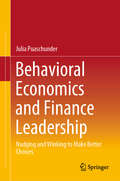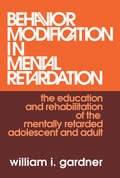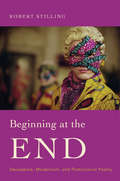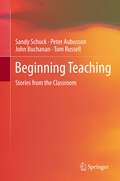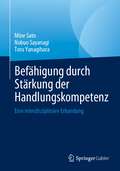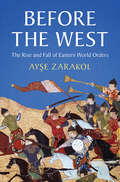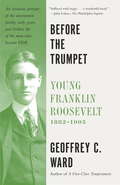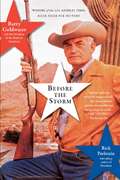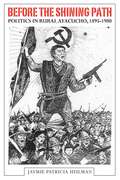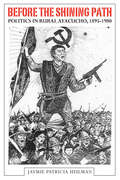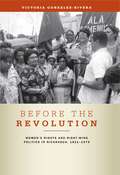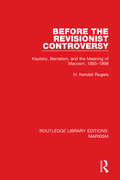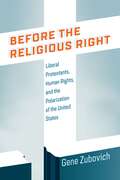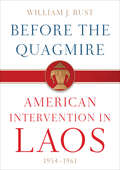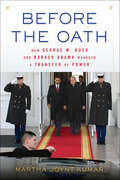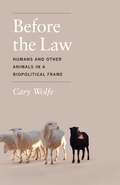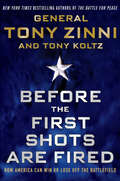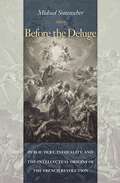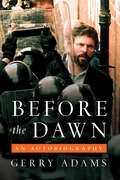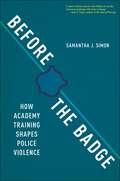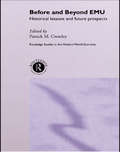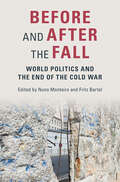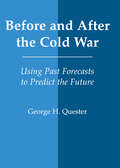- Table View
- List View
Behavioral Economics and Finance Leadership: Nudging and Winking to Make Better Choices
by Julia PuaschunderThis book explores human decision-making heuristics and studies how nudging and winking can help citizens to make rational choices. By applying the behavioral economics approach to political outcomes, it demonstrates how economics can be employed for the greater societal good. It starts with a review of the current literature on human decision-making failures in Europe and North America, presenting the wide range of nudges and winks developed to curb the harmful consequences of human decision-making fallibility. It then discusses the use of mental heuristics, biases and nudges in the finance domain to benefit economic markets by providing clear communication strategies. Lastly, the author proposes clear leadership and followership directives on nudging in the digital age. This book appeals to scholars and policy makers interested in rational decision-making and the use of nudging and winking in the digital age.
Behavior Modification in Mental Retardation: The Education and Rehabilitation of the Mentally Retarded Adolescent and Adult
by William GardnerIn this important book, one of the most exciting and promising developments in clinical psychology-behavior modification is applied to the treatment of the mentally retarded, particularly those whose behavior poses difficult problems for institutions. Professor Gardner presents an easily intelligible yet detailed account of the concepts and practices of behavior modification and the underlying learning systems, with numerous clinical illustrations of applying specific techniques to various educational and rehabilitation problems. A thorough discussion of the inadequacies of the psychological evaluation systems normally used in education and rehabilitation is offered, along with an alternative behavior analysis approach that provides a method of translating evaluation data into treatment practices. In explaining behavior analysis, the author takes into account the limited behavioral repertoire of the retarded and environmental deficits. Individual chapters on respondent, operant, and observational learning, and a detailed discussion of a functional analysis approach to evaluation, are included. Proven behavior modification strategies are presented along with a review of related research and clinical studies. The book closes with a detailed description of a research program for the design and testing of sheltered workshop systems for the retarded and emotionally disturbed. The positive approach inherent in the belief that behavior is modifiable-even in the severely limited retarded-is in marked contrast to the pessimism of other systems of therapy, education, and training. Also, the author has concentrated throughout on making the book understandable to clinicians and students with no previous knowledge of behavior modification. Besides serving as a valuable handbook for all treatment personnel, the book can also be used as a basic text for various courses dealing with mental retardation.
Beginning at the End: Decadence, Modernism, and Postcolonial Poetry
by Robert Stilling StillingDuring the struggle for decolonization, Frantz Fanon argued that artists who mimicked European aestheticism were “beginning at the end,” skipping the inventive phase of youth for a decadence thought more typical of Europe’s declining empires. Robert Stilling takes up Fanon’s assertion to argue that decadence became a key idea in postcolonial thought, describing both the failures of revolutionary nationalism and the assertion of new cosmopolitan ideas about poetry and art. In Stilling’s account, anglophone postcolonial artists have reshaped modernist forms associated with the idea of art for art’s sake and often condemned as decadent. By reading decadent works by J. K. Huysmans, Walter Pater, Henry James, and Oscar Wilde alongside Chinua Achebe, Derek Walcott, Agha Shahid Ali, Derek Mahon, Yinka Shonibare, Wole Soyinka, and Bernardine Evaristo, Stilling shows how postcolonial artists reimagined the politics of aestheticism in the service of anticolonial critique. He also shows how fin de siècle figures such as Wilde questioned the imperial ideologies of their own era. Like their European counterparts, postcolonial artists have had to negotiate between the imaginative demands of art and the pressure to conform to a revolutionary politics seemingly inseparable from realism. Beginning at the End argues that both groups—European decadents and postcolonial artists—maintained commitments to artifice while fostering oppositional politics. It asks that we recognize what aestheticism has contributed to politically engaged postcolonial literature. At the same time, Stilling breaks down the boundaries around decadent literature, taking it outside of Europe and emphasizing the global reach of its imaginative transgressions.
Beginning Teaching: Stories from the Classroom
by John Buchanan Tom Russell Sandy Schuck Peter AubussonThe experiences of the first years of new teachers' professional lives are critical to their decisions about embracing or leaving the teaching profession. Writ large, these experiences have the potential to either underpin or undermine the growth and development of the teaching profession. This book offers a research-based account of beginning teachers' experiences, told from their own perspectives and often in their own words. Beginning Teaching: Stories from the Classroom provides valuable source material to inform teacher education practices. The authors draw on more than 20 years of research on the professional learning, retention and attrition of beginning teachers to provide evocative illustrations of the challenges and successes that occur in the early years of teaching. The compelling and coherent narratives will appeal not only to student and graduate teachers but also to program designers, coaches and senior managers in schools. Above all, the book speaks to teacher educators in the hope that the experiences discussed here will suggest ways of supporting student teachers to grow and flourish once they launch their careers in the profession. These evocative stories express beginning teachers' anguish and elation and also provide testimony to their resilience and perseverance in an altruistic profession. The analysis and interpretation of their stories will challenge and uplift; inspire and shame; give cause for celebration and melancholy; generate empathy and provoke introspection. Above all else, these stories call for change.
Befähigung durch Stärkung der Handlungskompetenz: Eine interdisziplinäre Erkundung
by Mine Sato Nobuo Sayanagi Toru YanagiharaDieses Buch konzentriert sich auf das Verständnis von Faktoren und Mechanismen, die an der Entwicklung von Handlungskompetenz beteiligt sind, hauptsächlich in drei verwandten Kontexten: partizipative Entwicklung, Beratungsarbeit und Dienstleistungstransaktionen. Ausgangspunkt der Forschung ist die Erkenntnis, dass "agency" (allgemein verstanden als Wille und Praxis der Selbstbestimmung und des Selbstmanagements) bei den Nutznießern von Dienstleistungen und Projekten eine entscheidende Rolle für die effektive Umsetzung und Nachhaltigkeit spielt. Das Projekt befasst sich mit diesem Thema, wobei der Schwerpunkt auf den inneren Fähigkeiten und Orientierungen der Menschen liegt, und wirft die Frage auf, wie solche Fähigkeiten und Orientierungen in der Praxis von externen Akteuren im Bereich der öffentlichen Politik für sozioökonomische und internationale Entwicklung gefördert und aktiviert werden könnten. Das Projekt ist so angelegt, dass es die traditionellen disziplinären Grenzen überschreitet und anthropologische, psychologische und wirtschaftliche Ansätze und Perspektiven miteinander verbindet.
Befristete Beschäftigungsverhältnisse junger Erwachsener: Folgen für Partnerschaft und private Zukunftsgestaltung (Familienforschung)
by Daniel BaronIn den vergangenen drei Jahrzehnten sind die Anteile befristeter Beschäftigungsverhältnisse bei jungen Erwachsenen in der Bundesrepublik Deutschland und in anderen spätkapitalistischen Gesellschaften deutlich angestiegen. Eingebettet in fortdauernde Trends einer Verringerung wohlfahrtsstaatlicher Sicherungsstandards hat diese Entwicklung dazu beigetragen, dass sich Übergänge in stabile berufliche Karrieren und planbare private Zukunftsgestaltungen diversifizieren und verzögern. In der vorliegenden Studie wird eine soziologische Erklärung der Auswirkungen befristeter Beschäftigung auf private und partnerschaftliche Zukunftsgestaltungen von jungen Erwachsenen theoriegeleitet ausgearbeitet und empirisch überprüft. Da mit der Ausweitung befristeter Beschäftigung das klassische männliche Ernährermodell in Begründungsnot gerät, so die zentrale These, werden Neuaushandlungen von Geschlechterrollenarrangements in jungen Partnerschaften erforderlich. Nicht allein sozioökonomische Risiken im Kontext befristeter Beschäftigung, auch die sich wandelnden geschlechter- und erwerbsbezogenen Rollenerwartungen wirken sich verzögernd auf private und partnerschaftliche Zukunftsgestaltungen aus.Die Studie richtet sich an Forschende, Lehrende und Studierende der Soziologie, Politikwissenschaft, Psychologie und in benachbarten sozialwissenschaftlichen Disziplinen. Ebenso adressiert sie methodisch versierte Praktiker*
Before the West: The Rise and Fall of Eastern World Orders (LSE International Studies)
by Ayşe ZarakolHow would the history of international relations in 'the East' be written if we did not always read the ending – the Rise of the West and the decline of the East – into the past? What if we did not assume that Asia was just a residual category, a variant of 'not-Europe', but saw it as a space of with its own particular history and sociopolitical dynamics, not defined only by encounters with European colonialism? How would our understanding of sovereignty, as well as our theories about the causes of the decline of Great Powers and international orders, change as a result? For the first time, Before the West offers a grand narrative of (Eur)Asia as a space connected by normatively and institutionally overlapping successive world orders originating from the Mongol Empire. It also uses that history to rethink the foundational concepts and debates of international relations, such as order and decline.
Before the Trumpet: Young Franklin Roosevelt, 1882-1905
by Geoffrey C. WardBefore Pearl Harbor, before polio and his entry into politics, FDR was a handsome, pampered, but strong-willed youth, the center of a rarefied world. In Before the Trumpet, the award-winning historian Geoffrey C. Ward transports the reader to that world--Hyde Park on the Hudson and Campobello Island, Groton and Harvard and the Continent--to recreate as never before the formative years of the man who would become the 20th century's greatest president. Here, drawn from thousands of original documents (many never previously published), is a richly-detailed, intimate biography, its central figure surrounded by a colorful cast that includes an opium smuggler and a pious headmaster; Franklin's distant cousin, Theodore and his remarkable mother, Sara; and the still-more remarkable young woman he wooed and won, his cousin Eleanor. This is a tale that would grip the reader even if its central character had not grown up to be FDR.
Before the Storm: Barry Goldwater and the Unmaking of the American Consensus
by Rick PerlsteinAcclaimed historian Rick Perlstein chronicles the rise of the conservative movement in the liberal 1960s. At the heart of the story is Barry Goldwater, the renegade Republican from Arizona who loathed federal government, despised liberals, and mocked opeaceful coexistenceOCO with the USSR. PerlsteinOCOs narrative shines a light on a whole world of conservatives and their antagonists, including William F. Buckley, Nelson Rockefeller, and Bill Moyers. Vividly written, "Before the Storm" is an essential book about the 1960s. "
Before the Shining Path: Politics in Rural Ayacucho, 1895-1980
by Jaymie Patricia HeilmanThis study uncovers rural Ayacucho's vibrant but largely unstudied twentieth-century political history and contends that the Shining Path was the last and most extreme of a series of radical political movements that indigenous peasants pursued.
Before the Shining Path
by Jaymie HeilmanFrom 1980 to 1992, Maoist Shining Path rebels, Peruvian state forces, and Andean peasants waged a bitter civil war that left some 69,000 people dead. Using archival research and oral interviews,Before the Shining Pathis the first long-term historical examination of the Shining Path's political, economic, and social antecedents in Ayacucho, the department where the Shining Path initiated its war. This study uncovers rural Ayacucho's vibrant but largely unstudied twentieth-century political history and contends that the Shining Path was the last and most extreme of a series of radical political movements that indigenous peasants pursued. The Shining Path's violence against rural indigenous populations exposed the tight hold of anti-Indian prejudice inside Peru, as rebels reproduced the same hatreds they aimed to defeat. But, this was nothing new. Heilman reveals that minute divides inside rural indigenous communities repeatedly led to violent conflict across the twentieth century.
Before the Revolution: Women's Rights and Right-Wing Politics in Nicaragua, 1821–1979
by Victoria González-RiveraThose who survived the brutal dictatorship of the Somoza family have tended to portray the rise of the women’s movement and feminist activism as part of the overall story of the anti-Somoza resistance. But this depiction of heroic struggle obscures a much more complicated history. As Victoria González-Rivera reveals in this book, some Nicaraguan women expressed early interest in eliminating the tyranny of male domination, and this interest grew into full-fledged campaigns for female suffrage and access to education by the 1880s. By the 1920s a feminist movement had emerged among urban, middle-class women, and it lasted for two more decades until it was eclipsed in the 1950s by a nonfeminist movement of mainly Catholic, urban, middle-class and working-class women who supported the liberal, populist, patron-clientelistic regime of the Somozas in return for the right to vote and various economic, educational, and political opportunities. Counterintuitively, it was actually the Somozas who encouraged women's participation in the public sphere (as long as they remained loyal Somocistas). Their opponents, the Sandinistas and Conservatives, often appealed to women through their maternal identity. What emerges from this fine-grained analysis is a picture of a much more complex political landscape than that portrayed by the simplifying myths of current Nicaraguan historiography, and we can now see why and how the Somoza dictatorship did not endure by dint of fear and compulsion alone.
Before the Revolution: Women's Rights and Right-Wing Politics in Nicaragua, 1821–1979
by Victoria González-RiveraThose who survived the brutal dictatorship of the Somoza family have tended to portray the rise of the women’s movement and feminist activism as part of the overall story of the anti-Somoza resistance. But this depiction of heroic struggle obscures a much more complicated history. As Victoria González-Rivera reveals in this book, some Nicaraguan women expressed early interest in eliminating the tyranny of male domination, and this interest grew into full-fledged campaigns for female suffrage and access to education by the 1880s. By the 1920s a feminist movement had emerged among urban, middle-class women, and it lasted for two more decades until it was eclipsed in the 1950s by a nonfeminist movement of mainly Catholic, urban, middle-class and working-class women who supported the liberal, populist, patron-clientelistic regime of the Somozas in return for the right to vote and various economic, educational, and political opportunities. Counterintuitively, it was actually the Somozas who encouraged women's participation in the public sphere (as long as they remained loyal Somocistas). Their opponents, the Sandinistas and Conservatives, often appealed to women through their maternal identity. What emerges from this fine-grained analysis is a picture of a much more complex political landscape than that portrayed by the simplifying myths of current Nicaraguan historiography, and we can now see why and how the Somoza dictatorship did not endure by dint of fear and compulsion alone.
Before the Revisionist Controversy: Kautsky, Bernstein, and the Meaning of Marxism, 1895-1898 (Routledge Library Editions: Marxism #1)
by H. Kendall RogersIn this book, first published in 1992, the author examines the polemic fought by German Social-Democratic Party leaders and intellectuals Karl Kautsky and Eduard Bernstein against what they perceived to be misunderstandings of Marxism propagated by members of the Social-Democratic Federation (SDF) in England and by the socialist leader Wilhelm Liebknecht in Germany. The debate raised basic questions of socialist theory, including whether the program of Marx and Engels called for scholarly study, parliamentary democracy, and gradual social evolution, or for Utopian speculation, economic collapse, and violent rebellion.
Before the Religious Right: Liberal Protestants, Human Rights, and the Polarization of the United States (Intellectual History of the Modern Age)
by Gene ZubovichWhen we think about religion and politics in the United States today, we think of conservative evangelicals. But for much of the twentieth century it was liberal Protestants who most profoundly shaped American politics. Leaders of this religious community wielded their influence to fight for social justice by lobbying for the New Deal, marching against segregation, and protesting the Vietnam War. Gene Zubovich shows that the important role of liberal Protestants in the battles over poverty, segregation, and U.S. foreign relations must be understood in a global context. Inspired by new transnational networks, ideas, and organizations, American liberal Protestants became some of the most important backers of the United Nations and early promoters of human rights. But they also saw local events from this global vantage point, concluding that a peaceful and just world order must begin at home. In the same way that the rise of the New Right cannot be understood apart from the mobilization of evangelicals, Zubovich shows that the rise of American liberalism in the twentieth century cannot be understood without a historical account of the global political mobilization of liberal Protestants.
Before the Quagmire: American Intervention in Laos, 1954–1961
by William J. RustThis critical study of US intervention in the Laotian Civil War is &“a major contribution to the literature on America's Southeast Asian involvement&” (Publishers Weekly). In the decade preceding the first US combat operations in Vietnam, the Eisenhower administration sought to defeat a communist-led insurgency in neighboring Laos. Although US foreign policy in the 1950s focused primarily on threats posed by the Soviet Union and the People's Republic of China, the American engagement in Laos evolved from a small cold war skirmish into a superpower confrontation near the end of President Eisenhower's second term. Ultimately, the American experience in Laos foreshadowed many of the mistakes made by the United States in Vietnam in the 1960s. In Before the Quagmire, historian William J. Rust examines key policy decisions made in Washington and how they were implementation on the ground in Laos, setting the US on a path to wider war in Southeast Asia. Drawing on previously untapped archival sources, Before the Quagmire documents how ineffective assistance to Laotian anticommunist elites reflected fundamental misunderstandings about the country's politics, history, and culture. A Choice Outstanding Academic Title
Before the Oath: How George W. Bush and Barack Obama Managed a Transfer of Power
by Martha Joynt KumarAn expert on presidential transitions illuminates the factors necessary for a successful handoff.Winner of the CHOICE Outstanding Academic Title of the Choice ACRLIt's one of the hallmarks of American democracy: on inauguration day, the departing president heeds the will of the people and hands the keys to power to a successor. The transition from one administration to the next sounds simple, even ceremonial. But in 2009, as President George W. Bush briefed President-elect Barack Obama about the ongoing wars and plummeting economy he'd soon inherit, the Bush team revealed that they were grappling with a late-breaking threat to the presidency: U.S. intelligence sources believed that a terror group with links to Al Qaeda planned to attack the National Mall during the inaugural festivities. Although this violence never materialized, its possibility made it clear that well-laid contingency plans were essential.Political scientist Martha Joynt Kumar uncovered this secret peril while interviewing senior Bush and Obama advisers for her latest book. In Before the Oath, Kumar documents how two presidential teams—one outgoing, the other incoming—must forge trusting alliances in order to help the new president succeed in his or her first term. Kumar enjoyed unprecedented access to several incumbent and candidate transition team members, and she combines in-depth scholarship with one-on-one interviews to put readers squarely behind the scenes. Using the Bush-Obama handoff as a lens through which to examine the presidential transition process, Kumar interweaves examples from previous administrations as far back as Truman-Eisenhower. Her subjects describe in vivid detail the challenges of sowing campaign ideals across a sprawling executive branch as Congress, the media, and external events press in. Kumar's lively account of lessons learned and pitfalls encountered during past presidential transitions provides an essential road map for presidential aspirants and their advisers, as well as campaign workers, federal employees, and political appointees.
Before the Law: Humans and Other Animals in a Biopolitical Frame
by Cary WolfeAnimal studies and biopolitics are two of the most dynamic areas of interdisciplinary scholarship, but until now, they have had little to say to each other. Bringing these two emergent areas of thought into direct conversation in Before the Law, Cary Wolfe fosters a new discussion about the status of nonhuman animals and the shared plight of humans and animals under biopolitics. Wolfe argues that the human-animal distinction must be supplemented with the central distinction of biopolitics: the difference between those animals that are members of a community and those that are deemed killable but not murderable. From this understanding, we can begin to make sense of the fact that this distinction prevails within both the human and animal domains and address such difficult issues as why we afford some animals unprecedented levels of care and recognition while subjecting others to unparalleled forms of brutality and exploitation. Engaging with many major figures in biopolitical thought—from Heidegger, Arendt, and Foucault to Agamben, Esposito, and Derrida—Wolfe explores how biopolitics can help us understand both the ethical and political dimensions of the current questions surrounding the rights of animals.
Before the First Shots Are Fired: How America Can Win or Lose Off the Battlefield
by Tony Koltz Tony ZinniFor the better part of the last half century, the United States has been the World's Police, claiming to defend ideologies, allies, and our national security through brute force. But is military action always the most appropriate response? Drawing on his vast experience, from combat in Vietnam to peacekeeping in Somalia, to war games in Washington, DC and negotiations with former rebels in the Philippines, retired four-star General Tony Zinni argues that we have a lot of work to do to make the process of going to war—or not—more clear-eyed and ultimately successful. He examines the relationship between the executive and the military (including the difference between passive and engaged presidents); the failures of the Joint Chief of Staff; the challenges of working with the UN, coalition forces, and NATO; the difference between young, on the ground officers and less savvy senior leaders; the role of special forces and drone warfare; and the difficult choices that need to be made to create tomorrow's military. Among his provocative points:* Virtually every recent American military operation follows a disconnected series of actions that lead to outcomes we never foresaw or intended.* We need to assign accountability for the political decisions that can make or break a mission.* Words and ideas are as important to victory in today's conflicts as bullets.* The cyber "war" is ongoing. Either you must build better tech than the other guy, or you must steal it.* Our foreign aid budget is pitiful, our State Department, USAID, and the other government agencies that we critically need to be on a par with our military are underfunded, undermanned, and poorly structured for their current objectives.From the Oval Office to the battlefield, Before the First Shots Are Fired is a hard-hitting analysis of the history of America's use of military action and a spirited call for change.
Before the Deluge: Public Debt, Inequality, and the Intellectual Origins of the French Revolution
by Michael SonenscherEver since the French Revolution, Madame de Pompadour's comment, "Après moi, le déluge" (after me, the deluge), has looked like a callous if accurate prophecy of the political cataclysms that began in 1789. But decades before the Bastille fell, French writers had used the phrase to describe a different kind of selfish recklessness--not toward the flood of revolution but, rather, toward the flood of public debt. In Before the Deluge, Michael Sonenscher examines these fears and the responses to them, and the result is nothing less than a new way of thinking about the intellectual origins of the French Revolution. In this nightmare vision of the future, many prerevolutionary observers predicted that the pressures generated by modern war finance would set off a chain of debt defaults that would either destroy established political orders or cause a sudden lurch into despotic rule. Nor was it clear that constitutional government could keep this possibility at bay. Constitutional government might make public credit more secure, but public credit might undermine constitutional government itself. Before the Deluge examines how this predicament gave rise to a widespread eighteenth-century interest in figuring out how to establish and maintain representative governments able to realize the promise of public credit while avoiding its peril. By doing so, the book throws new light on a neglected aspect of modern political thought and on the French Revolution.
Before the Dawn: An Autobiography
by Gerry Adams&“In this compelling memoir of his early life, the president of Sinn Féin . . . recalls the development of the modern &‘Troubles&’ in Northern Ireland&” (Kirkus). Gerry Adams was the president of Sinn Féin, the political wing of the Irish Republican Amy, for more than thirty years. In this autobiography of his early life, he shares a personal account of the political unrest and violence of the 1970s and 80s. He opens up about his imprisonment, secret talks with the British government, his leadership role in Sinn Féin, and the tragic hunger strike by imprisoned IRA prisoners in 1981. Born in 1948, Adams vividly recalls growing up in the working-class Ballymurphy district of West Belfast, where he became involved in the civil rights campaign in the late 1960s. When the unionist regime responded to the protests with violence, the situation exploded into conflict. Adams recounts his growing radicalization, his relationship with the IRA, and the British use of secret courts to condemn republicans. Adams was a political prisoner who spent a total of five years in the notorious Long Kesh prison camp. Though he opposed the hunger strike, Adams was instrumental in the mass campaign of support which saw Bobby Sands elected to British Parliament and Ciaran Doherty and Kevin Agnew elected to Irish Parliament. First published in 1996, this edition contains a new introduction and epilogue written by the author, covering Adams&’s family, Brexit, and the peace process.
Before the Badge: How Academy Training Shapes Police Violence
by Samantha J. SimonAn inside look at how police officers are trained to perpetuate state violenceMichael Brown. Philando Castile. George Floyd. Breonna Taylor. As the names of those killed by the police became cemented into public memory, the American public took to the streets in unprecedented numbers to mourn, organize, and demand changes to the current system of policing. In response, police departments across the country committed themselves to change, pledging to hire more women and people of color, incorporate diversity training, and instruct officers to verbally de-escalate interactions with the public.These reform efforts tend to rely on a “bad apple” argument, focusing the nature and scope of the problem on the behavior of specific individuals and rarely considering the broader organizational process that determines who is allowed to patrol the public and how they learn to do their jobs. In Before the Badge, Samantha J. Simon provides a firsthand look into how police officers are selected and trained, describing every stage of the process, including recruitment, classroom instruction, and tactical training.Simon spent a year at police academies participating in the training alongside cadets, giving her a visceral, hands-on understanding of how police training operates. Using rich and detailed examples, she reveals that the process does more than test a cadet’s physical or intellectual abilities. Instead, it socializes cadets into a system of state violence. As training progresses, cadets are expected to see themselves as warriors and to view Black and Latino/a members of the public as their enemies. Cadets who cannot or will not uphold this approach end up washing out. In Before the Badge, Simon explains how this training creates a context in which patterns of police violence persist and implores readers to re-envision the future of policing in the United States.
Before and Beyond EMU: Historical Lessons and Future Prospects (Routledge Studies In The Modern World Economy Ser. #Vol. 35)
by Patrick M. CrowleyThe launch of the Euro has already had profound effects on both European economies and societies - but it is also of huge importance for the international community as a whole. This timely book, from a collection of key names in European Integration Studies, is an authoritative piece of work that is truly multi-disciplinary by nature.
Before and After the Fall: World Politics and the End of the Cold War
by Nuno P. Monteiro Fritz BartelAs the Cold War came to a close in 1991, US President George H. W. Bush famously saw its shocking demise as the dawn of a 'new world order' that would prize peace and expand liberal democratic capitalism. Thirty years later, with China on the rise, Russia resurgent, and populism roiling the Western world, it is clear that Bush's declaration remains elusive. In this book, leading scholars of international affairs offer fresh insight into why the hopes of the early post-Cold War period have been dashed and the challenges ahead. As the world marks the thirtieth anniversary of the collapse of the Soviet Union, this book brings together historians and political scientists to examine the changes and continuities in world politics that emerged at the end of the Cold War and shaped the world we inhabit today.
Before and After the Cold War: Using Past Forecasts to Predict the Future
by George H. QuesterThe end of the Cold War came as good news for most of the world. No one had predicted the collapse of Communist rule for several decades. This book looks at how political scientists failed to predict such a quick resolution and ways in which the world might develop post Cold War.
